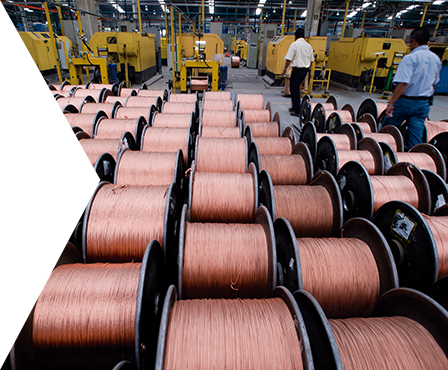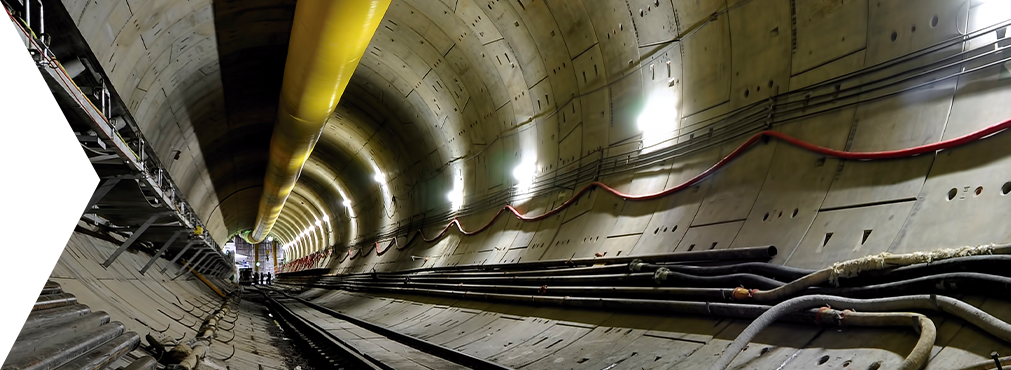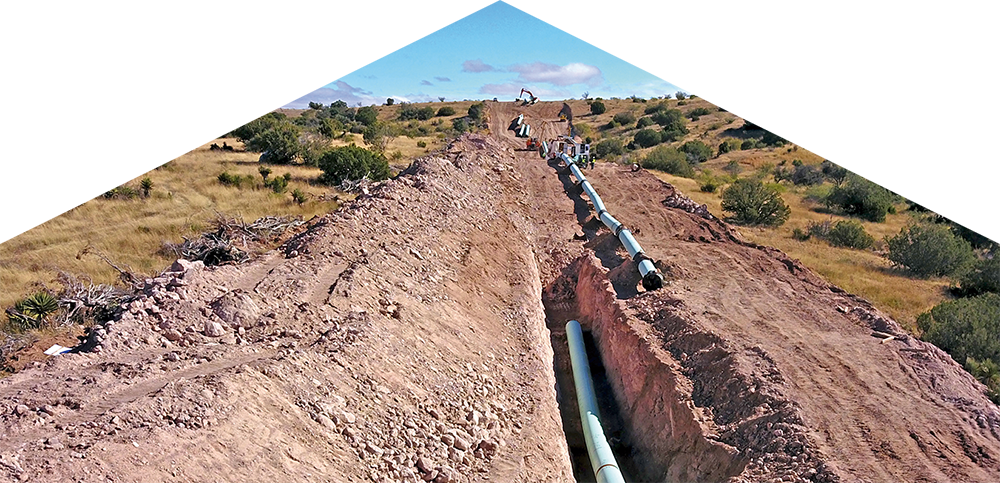Letter to Shareholders
Economic Outlook for 2018
During 2018, the global environment took a turn for the better, aided by the growth of the United States economy and despite the increase in interest rates, added to the tense relationship between that country and China. Both factors are the result of the bilateral imposition of tariffs, which affect the trade between those two countries and which have given rise to renegotiation strategies in their commercial relationship.
Benefitting from the reform of the internal revenue laws, which reduced corporate taxes from 35.0% to 21.0%, impelling the generation of corporate profits, the United States economy grew by 2.9% during 2018, a rate that produced an increase of 7.0% in nonresidential investment in that country. Meanwhile, domestic demand continued to show a positive trend during the year, with the consumption of durable goods increasing by 5.7%. Based on these factors, the United States Federal Reserve continued with its monetary policies, and the interest rate, which was more than 1.50% at the end of 2017, was adjusted to 2.50% by the end of 2018. Nevertheless, since the beginning of 2019, the Fed has shown signs of caution concerning economic growth, and at the beginning of the latter year it has predicted that the economy will grow at a slower pace in 2019, with a moderate and stable expansion.
As for the Mexican economy, Gross Domestic Product grew by 2.0% during the year, which was mostly attributable to the services sector of the economy. In this respect, the commercial activity as well as the mass media and the financial sector itself saw an expansion greater than other sectors of the economy. The economic growth of the country was partially affected by the performance of the manufacturing sector in 2018, due mainly to the lower production of oil, which was around 1.7 million barrels of oil per day.
As for the fluctuation in the value of the Mexican peso against the United States dollar, this variation was due to the volatility that characterized the year, causing a maximum exchange rate of $20.60 pesos per dollar during that period. Thus, the exchange rate went from $19.66 in 2017 to $19.65 pesos per dollar at the end of 2018.
The negotiations over the United States-Mexico-Canada Agreement (known as USMCA) were concluded during the year, thereby reducing the uncertainty that had been present since the last presidential election in the United States in respect to the modernization of the commercial relationships between these three countries. It is expected that this new agreement will be approved by the legislative bodies of each of the participating nations, to thereby strengthen Mexico’s position in the North American market as an exporting nation, an attractive destination for investment and a capital for industrial development in the country.
In respect to the annual evolution of other indicators of the Mexican economy, the rate of inflation decreased in Mexico in 2018, ending at 4.83%, which compares favorably with the rate of 6.77% of the previous year. This favorable result was principally due to a smaller increase in the price of gasoline during the year. As for the country’s trade balance, there was a deficit of $13.704 billion USD, increasing by $2.736 billion USD in respect to 2017. Specifically, the deficit in the petroleum trade balance grew by $4.881 billion USD during the year, to the amount of $23.190 billion USD. Nevertheless, the surplus in the non-petroleum trade balance grew by 26.7% to end up at $9.485 billion USD at the end of the year, to thereby reflect an increase of 9.1% in Mexico’s manufacturing exports.
Recently, various austerity, transparency and public finances policies and measures have been established by the new Mexican Government to combat corruption, insecurity and poverty in the country. The said problems represent the principal obstacles that hinder the generation of jobs and internal economic growth.
The Mexican Government has proposed as an objective a growth of the Mexican economy of 4.0% annually, which implies that greater investments must be carried out. In this respect, the Ministry of the Treasury and Public Credit has considered raising public investment from 2.6% of the Gross Domestic Product in 2018 to at least 5.0% of the said economic indicator, and it calculates that the participation of the private sector must be greater than 20% in order to drive the development of Mexico.
Grupo Carso
During 2018, Mexico was exposed to an increased level of volatility and uncertainty regarding the country’s economy. However, the solidity of the divisions comprised by Grupo Carso, and our financial and operational discipline, enabled us to maintain the Group’s market share during the year.
Grupo Carso’s consolidated sales grew by 3.3% in the year to be determined at $96.640 billion pesos in 2018. In turn, operating profits and EBITDA stood at $10.559 billion pesos and $13.023 billion pesos, respectively, representing a decrease of 18.4% and 6.1% in the year. In this respect, the decrease in profitability level resulted mainly from registering extraordinary revenues in 2017 derived from the sales of shares in associated companies, as well as the recognition of a higher level of reserves for overdue accounts. Finally, the net controlling profit of Grupo Carso was $9.008 billion pesos, while the net profit per share stood at $3.95 pesos in 2018.
In 2018 Grupo Carso maintained its market share due to the solidity of our divisions and our financial and operational discipline.

Grupo Sanborns sales grew 4.0% in 2018, a positive fluctuation reflecting the favorable performance of the Sears, Sanborns and iShop/MixUp stores. After the completion of the expansion plan, two new combined-format Sears-Sanborns stores began operations. This concept reflects the strategy of having a Sanborns restaurant inside a Sears department store, combining the offer of products and services of each chain. As a result of the profitability approach followed, some Sanborns stores were closed in the year. Further, Grupo Sanborns is performing tasks to assess the profitability per square meter of all of the Sears and Sanborns stores. The purpose of these tasks is to optimize the layout and the commercial spaces of the stores. In addition, several credit control measures were strengthened as a result of the decrease in the payment capacity of our cardholders, which was affected by increased interest rates in Mexico. Finally, Grupo Sanborns is continuing its investments in Sears distribution centers, to develop distribution and logistics in the physical stores under this business format. Likewise, the e-commerce initiatives in all our formats and the ClaroShop.com marketplace are an integral part of our capital expenditures.
The sales of Grupo Condumex grew 7.5% in the year, where the telecommunication, harnesses and construction segments showed a major contribution to sales in 2018. In turn, the automotive segment recorded a sales level similar to the one in the previous year, despite the change observed regarding automotive platforms and the beginning of production of new harnesses models. As in the past, our assembly plants in Jaral del Progreso, Ocampo and San Felipe, in the Mexican state of Guanajuato, procured from one of our clients, the “GM Supplier Quality Excellence Award” for having satisfied the highest quality and performance levels. In turn, we received from our client Daimler Autobuses, the “Daimler Masters of Quality 2018 Award”. Despite fluctuations in the price of copper and the recognition of increased costs regarding security in the Grupo Condumex distribution chain, the business unit expanded its contribution to consolidated operating profits, which went from 34.3% in 2017 to 37.9% in 2018. Further, a trend on Grupo Condumex sales growth is being observed, to be materialized in 2019.
Carso Infraestructura y Construcción (“CICSA”) sales decreased by 10.2%, which is mainly the result of the completion of major projects according to the time schedules thereof, together with the interruption of construction works for Runway 3 and a terminal building of the New Mexico City International Airport, a project known as NAICM or referred to Mexico City Texcoco Airport. In this development, CICSA participated in consortium with other entities, as well as supplier. Together with FCC, a CICSA’s partner, the division has diversified its infrastructure and construction activities towards international markets. Thus, in 2018 we began the expansion project to six lanes of Section 1 (Chorrera Santa Cruz) of the Beach Corridor in Panama, securing the adjudication for acting on Section 2 of said corridor. Furthermore, we have started the project for improving the Los Chinamos – El Ayote road, located in Nicaragua.
The Carso Energy division increased its sales by 15.9% during 2018. This is the result both of oil production and marketing through our company Tabasco Oil Company in Colombia, and the lease of two gas ducts located in the state of Texas in the U.S., to the Federal Electricity Commission of Mexico, for gas transportation. This is a joint business with an entity where we hold a 51.0% interest, although we do not consolidate the results for this operation. Additionally, due to lack of release of rights of way, the construction of the Samalayuca – Sásabe gas duct, located between the Mexican states of Chihuahua and Sonora, advanced at a lesser rate than expected. As in the case of other divisions, Carso Energy continued seeking business opportunities in the year, such as those regarding alternative energies. We have begun the exploration phase in two geothermal fields in 2018, to focus later on, on the generation phase. Furthermore, we have started exploration works in the two blocks that were adjudicated to us under the Round 2.3 oil bids of the National Hydrocarbon Commission in Mexico.
Grupo Carso participates in several associated companies, such as, Elementia, GMéxico Transportes, Trans-pecos Pipeline LLC, Comanche Pipeline LLC and Inmuebles SROM, which results we do not consolidate. Taking into account sales and EBITDA for said joint ventures, Grupo Carso would record $19.491 billion pesos and $5.641 billion pesos, respectively, in the year 2018 for both financial indicators.
Grupo Carso’s financial position remains solid. Total assets increased by 16.0% to amount to $137.889 billion pesos, while consolidated net worth increased by 15.1%, amounting to $93.178 billion pesos at the close of the year. In turn, Grupo Carso recorded $13.187 billion as cost-bearing debt at the close of 2018.
Emisor Oriente Tunnel

Due to its corporate structure and financial strength, Grupo Carso is in a position of taking advantage of future business opportunities. The net cash flow generated by operating activities was $9.292 billion pesos, while the net debt to 12-month EBITDA ratio was 0.33 times. The amount of resources used for capital expenditures amounted to $4.341 billion pesos in 2018. Grupo Carso paid an ordinary dividend in cash at a rate of 0.92 pesos per share between the months of June and November 2018. In turn, GCARSO Series A-1 shares increased their value by 8.4% going from $64.90 pesos to $70.40 pesos. As from March 19th, 2019, our shares are again included in the Price and Quote Index (S&P/BMV IPC) in the Mexican Stock Exchange.
In terms of sustainability, the Carlos Slim Foundation is developing 96 programs and projects in thirteen different areas, including education, jobs, health, sports, culture and the environment, reaching more than 45 million beneficiaries in Mexico and other Latin American countries.
Of particular relevance for the Foundation, beginning in September of 2017, is the “Mexico Unido” initiative, to address the damage caused by the earthquakes. During the emergency phase, the companies in the Group and their volunteers responded immediately to the basic needs of the thousands of people who were affected, by providing food, field tents, blankets, sleeping mats, water purifiers and telephone services.
During the phase involving the reconstruction and building of new homes and markets, we issued a call in which the Foundation would contribute five pesos to match every peso received. We received a response from 217 thousand donors who placed their trust in us and donated $412.4 million pesos, to which was added $2.0618 billion pesos contributed by the Foundation. This money has been used for the rebuilding of homes, for health and educational infrastructure and for the reconstruction of the nation’s cultural patrimony. As we have established from the beginning, the actions taken and the application of these resources have been published, month by month, in the Foundation’s web page.
On behalf of the Company’s Board of Directors, I thank our shareholders, clients and suppliers for their trust in us. To all our employees, in addition to thanking them, I invite them to continue showing their level of motivation and commitment to continue enabling Grupo Carso to reach its goals, to continue improving its performance as it does each year and to continue contributing to the development of our country.
Sincerely yours,
Carlos Slim Domit
Chairman of the Board of Directors
3.3%
grew the total
consolidated
sales
Samalayuca-Sásabe gas pipeline
